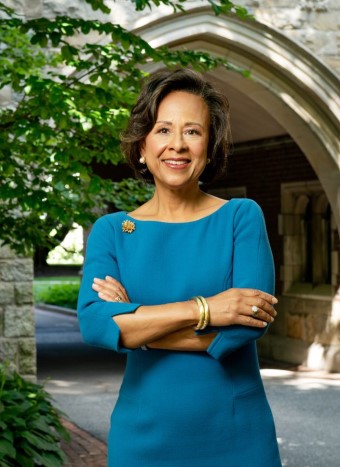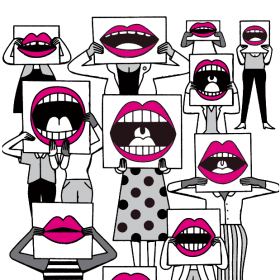
In the onslaught of those year-end lists and proclamations that make the rounds, you might have missed one: the Oxford Dictionaries word of the year for 2016. It may seem trivial, but the choice—“post-truth”—is a worrisome sign of where we may be headed. Oxford Dictionaries defines post-truth as “circumstances in which objective facts are less influential in shaping public opinion than appeals to emotion and personal belief.” The advent of such a worldview has been foremost on my mind as I consider how to build on Wellesley’s commitment to academic excellence in 2017 and into the future.
The stakes are high. Wellesley is a community that prides itself on fact-based argument, and so we are troubled to find ourselves in a space in which, among other disturbing post-truth ideas, climate change is flatly denied, despite scientific consensus; research on the life-saving benefits of vaccines is dismissed based on a debunked study; the mainstream media writes without irony about “post-truth politics”; and too many opinions are shaped by “fake news.”
As someone who has spent her life seeking scientific truths about our health, I find post-truth rationale to be anathema to our well-being—and to a democratic society. Against this backdrop, the need for liberal arts education—founded in ethical and data-driven inquiry and the use of evidence to craft civil discourse—could not be clearer.
As I reflect on what Wellesley students must be prepared to encounter, I am reminded of a New Yorker cartoon picturing contestants on a game show. The caption reads, “I’m sorry, Jeannie, your answer was correct, but Kevin shouted his incorrect answer over yours, so he gets the points.” Sadly, for so many women, this experience is hardly new. And it is not funny. The cartoon also lampoons the world in which we live: An objective truth is overtaken by the loudest, most insistent voice. The name of the satirical game show? Facts Don’t Matter.
Of course, for Wellesley students, the correct answers do matter, greatly.
Fortunately, during their four years at Wellesley, our students’ search for truth is unencumbered—and they are able to find their voices—because no one is shouting over them! Preparation, mastery of the available information, diligent study, supporting one’s claims, considering ideas that might run counter to yours—these are staples of a Wellesley education. They are the tools our graduates use to make their difference in the world, to help solve the world’s most pressing problems.
I want Wellesley to be in the vanguard of the rigorous pursuit of truth supported by fact-based knowledge, to fight against the rejection of evidence-based argument. We intend to confront and challenge those who normalize a discourse that replaces reason and objectively proven fact with bias and a seemingly unchecked faith in “being right.”
We must pursue the facts to avoid chaos. We must pursue the facts to overcome challenges that are more complex than at any time in human history. Global warming, pandemics, terrorism and violence, widening disparities between rich and poor—these are just a few of the urgent issues we face. We need to find ways to make common cause across party lines, across cultures, across belief systems. To do this, we will need to distinguish truth from spin. And our faculty—world-class scholar-teachers who push forward the frontiers of knowledge—will lead the way.
To be sure, this is not to say our beliefs, faith, and emotions are not important. They reflect our individuality, provide meaning, and sustain us. But we cannot let our emotions calcify a belief to the point that it hardens against scientific proof. We cannot rely entirely on assumptions or be satisfied with knowledge gaps when we have access to research, scholarship, and data. We must not be afraid to test our values and our beliefs against what can be verified and proven.
Let me end by citing a favorite author of mine, Toni Morrison. She has said, “I am myself a storyteller, and therefore, an optimist—a firm believer in the ethical bend of the human heart; a believer in the mind’s appetite for truth and its disgust with fraud and selfishness.” These words can inspire all of us in everything we do.







We ask that those who engage in Wellesley magazine's online community act with honesty, integrity, and respect. (Remember the honor code, alums?) We reserve the right to remove comments by impersonators or comments that are not civil and relevant to the subject at hand. By posting here, you are permitting Wellesley magazine to edit and republish your comment in all media. Please remember that all posts are public.